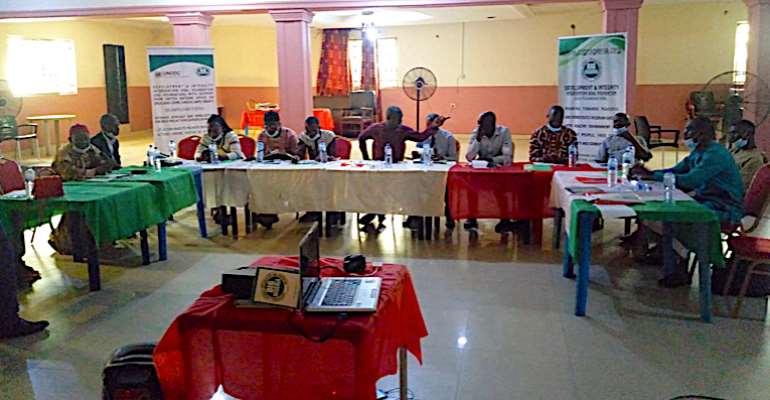Substance Abuse: NDLEA Blames The Courts As Ebonyi CSO Consult For Drug Free Action.

The growing rate of narcotics use, drug and substance abuse, especially among youths in Nigeria has remained an issue of great concern to both the government and well meaning citizens.
As efforts are made by concerned agencies to curb the distribution, peddling and abuse of existing ones, new and more dangerous drugs stealthily find their ways into the market on a daily basis, thereby compounding the problem.
For instance, the emergence of a crystal narcotic hallucinogen, Methamphetamine, codenamed ‘Mkpuru mmiri’ in Igbo language over the past few years, has brought a fatal dimension to drug abuse and its related criminal activities among youths, especially in South east, Nigeria.
There have been recurring reports of persons who killed their parents, wiped their own families, or committed one heinous crime or the other under the influence of the drug in recent times. The trend has become so worrisome that some of the drug prone communities have adopted self policing methods in curbing the menace.
To add impetus to this fight against drug/substance abuse and its resultant crimes in the zone, a Civil Society organization in Ebonyi State, Development and Integrity Intervention Goals Foundation (DIG) with support from the United Nations Office on Drug and Crime (UNODC), recently brought together stakeholders to plan collaborative action towards achieving a drug free society.
The event, Project Planning/co-creation meeting, held in Abakaliki, Ebonyi State capital, had in attendance, selected community youth leaders, traditional rulers, Town union executives, representative of women groups and other key stakeholders from the pilot communities: Enyigba in Abakaliki Council area, Ameka and Umunna in Ezza South and Afikpo South Council areas respectively.
Representatives of the National Drug Law Enforcement Agency, the Police, National Orientation Agency, the State Ministry of information, as well as the media, also participated in the meeting.
All the participants were in agreement that actions needed to be intensified in order to save the future of the country.
They regretted that apart from the very dangerous Methamphetamine, otherwise called Crystal Meth and other known illicit drugs such as Marijuana, cocaine and the likes, most youths abuse common medical drugs such as Cough syrups, pain killers, sometimes mixing them with alcoholic drinks to produce greater narcotic effect, a situation which they observed, further complicates the fight.
Sharing his experiences during the meeting, the Assistant Commander, Drug Demand Reduction, National Drug Law Enforcement Agency, Ebonyi State Command, Mr. Godwin Erepa, partly blamed the persistent illicit drug use and distribution on the Courts’ failure to always meet offenders with adequate punishments.
He noted that the Agency only has the powers to arrest drug offenders and charge them, while the courts reserve the right to prosecute and prescribe punishments. He regretted that most times, the punishments assigned to offenders by the Courts, ranging from minor fines to casual labour were not often strong enough to serve as deterrents.
Erepa narrated: “In one of our operations in Afikpo, for instance, we went through a very tasking and complex process of arresting a notorious drug dealer, who escaped on transit.
“We trailed and rearrested him after some months and handed over to the Court.
“But could you imagine the punishment given to him by the Court after prosecution?
“He was just asked to sweep their offices for two weeks, and was set free afterwards, to continue his illicit business.”
Erepa noted that the lacuna informed the recent proposal being pushed by NDLEA national boss, General Buba Maruwa, to allow the Agency the powers to prosecute drug offenders.
Others who spoke at the meeting, including the traditional ruler of Enyigba Community, Michael Nwobashi; Town Union President of Umunna Community, Onuoha Amah; a woman leader, Virginia nweze and the Director of Information in the State Ministry of Information and orientation, Kama Egwu, as well as Simon Mbam of the National orientation Agency, Ebonyi State office, blamed the high rate of youth involvement in drugs to unemployment with its consequent poverty and frustration.
While they called for sustained collaboration between governments, civil society organizations and well meaning citizens in the fight, they pledged to join hands with DIG foundation and UNODC to promote drug free actions in the State.
Drawing action plans, the participants agreed that integrating repentant drug addicts/users in both advocacy/campaigns against drugs would produce positive results through instrumentality of experience sharing.
They also identified greater involvement of patent medicine dealers, pharmaceutical Association of Nigeria and other relevant professional bodies; the media and other security agencies in the fight.
Focus group discussions, radio and television programs, talk shows, youth focused training, conferences; workshops and the use of social media were further suggested as viable platforms to advance the fight.
In an opening remark, the Executive Director of DIG foundation, Oliver Aja Chima, explained that the objectives of the meeting were to brief stakeholders on the UNODC supported project, seek stakeholder’s adoption, inputs and participation.
He added that the meeting was also to enable participants to brainstorm on the best approaches in the project implementation, assign roles and responsibilities and map out other stakeholders that could be integrated for better results.
